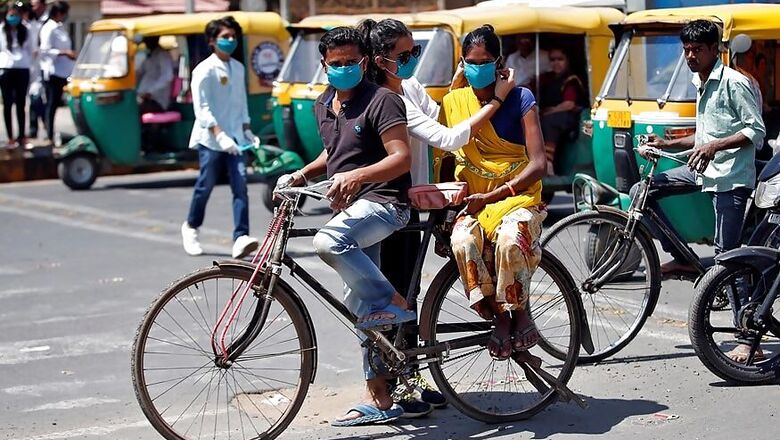
views
New Delhi: The effective rapid shutdown of large parts of the economy as part of the government's efforts to suppress the Covid-19 outbreak is likely just a taster of a possible global economic recession, sparking calls for Universal Basic Income, or free cash giveaways, as an emergency measure to support those affected.
Several economists have voiced fresh support for UBI as a possible answer to help the lakhs of workers who remain home in isolation without pay, but have to deal with an increasing count of bills. UBI is an unconditional flat regular payment from the state to every adult, and while the concept generally has many detractors, the very specific nature of the economic shock from the coronavirus outbreak and quarantine measures has changed the terms of the debate.
Among those who have supported it is former member of the Prime Minister’s Economic Advisory Council and Director of Research at Brookings India, Shamika Ravi, who on Tuesday sounded the alarm for UBI in India on Tuesday as a means to fight the “economic disruptions.”
“We are in the midst of a slowdown and we must put fiscal concerns aside to develop a UBI type support for those affected (to stem further decline in demand),” she tweeted.
The UBI or basic income is a governmental public program for a periodic, unconditional, automatic and non-withdrawable payment given to all citizens on an individual basis without means, test or work requirement. Some examples of UBI are the Alaska Permanent Fund in America, the Bolsa Familia in Brazil and the Rythu Bandhu scheme of Telangana. The Aadhar linked Public Distribution System for food ration is a quasi-UBI program.
Advocating for a more immediate support program under the crisis, the noted Indian economist, credited for her work in the economics of health and development, said that “social distancing” during the COVID-19 outbreak might translate into “job losses in the informal labour markets.”
While we firefight to contain #COVID2019 outbreak, it is also critical to look at the economic disruptions. We are in the midst of a slowdown but (1) must put fiscal concerns aside to develop an #UBI type support for those affected (to stem further decline in demand) 1/n — Dr. Shamika Ravi (@ShamikaRavi) March 17, 2020
The virus scare has forced multiple states across the country to order public places like malls, parks, theatres, stadiums etc. to close temporarily. These measures are in addition to the closure of educational institutions, postponement of sporting events and gatherings of more than 50 among others. All of this translates to massive financial losses.
Meanwhile, total cases in India have jumped to 147 by Wednesday, which includes 24 foreigners. Maharashtra has recorded the most cases at 38. Kerala, which is still recovering from the effects of a disastrous flood, follows in second with 24 and Uttar Pradesh is third with 14.
The worst-hit, as a result of the protectionist steps to counter the spread of the virus, will be the Indian economy which is already suffering, economists and rating agency projections have said. Moody’s Investors Service has said the pandemic will likely depress global growth in 2020 below 2.5 per cent alone.
Shamika said that the “government and Public Sector Units (PSU) must clear their outstanding dues immediately so that liquidity concerns don’t compound the situation further.”
The finance ministry on Saturday raised taxes on petrol and diesel by Rs 3 each to shore revenue may prove to be counterproductive in this environment, economists are debating on Twitter.
The Director of Research at Brookings India asserted that the “RBI must develop an urgent blueprint to support specific sectors that are likely to be hit hardest by the shutdown due to COVID-19.”
However, Shamika’s concerns for the Indian economy echoes along with similar opinions from many other countries where both politicians and economists have called for some sort of UBI or state-sponsored income support to sustain their economies.
Although Senator Mitt Romney of Utah didn’t call his plan UBI, on Monday, he demanded the Senate act swiftly on the House Relief Bill so that every American should get a $1000 one-time cheque to cover costs and “increase spending in the economy.”
Democratic Representative Tulsi Gabbard has also called for an emergency UBI: a payment of $1000 every month, and so does Representative Alexandria Ocasio-Cortez.
French President Emmanuel Macron on Tuesday, as another means to sustain, if not increase spending in the economy, announced all gas, electricity, water bills and rents to be suspended indefinitely.
In the UK, Chancellor of the Exchequer Rishi Sunak opened the budget on the virus outbreak saying that it is an ‘issue above party.’ He increased payments of their cash programs by announcing a fiscal stimulus totalling £30 billion Pounds, including welfare and business support.
Similarly, Hong Kong government’s proposed 10,000 Hong Kong dollars cash handouts to residents is expected to boost the city’s economy by 1 per cent, which has been pulled down by months of protest and now the virus outbreak.


















Comments
0 comment